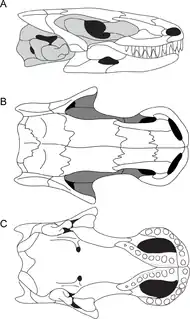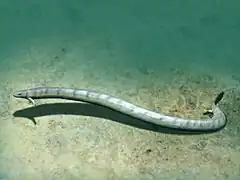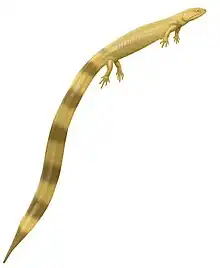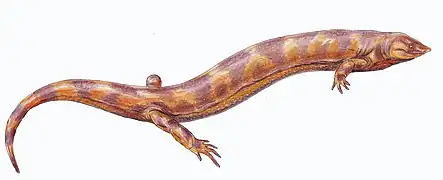| Brachydectes Temporal range: Carboniferous | |
|---|---|
 | |
| Reconstruction of B. newberryi | |
| Scientific classification | |
| Domain: | Eukaryota |
| Kingdom: | Animalia |
| Phylum: | Chordata |
| Clade: | †Recumbirostra |
| Order: | †Lysorophia |
| Family: | †Cocytinidae |
| Genus: | †Brachydectes Cope, 1868 |

Reconstructed skull of B. newberryi
Brachydectes is an extinct genus of lysorophian amphibian that lived from the Carboniferous. It had a very small head and long body, B. elongatus had 1–2 centimetres (0.39–0.79 in) long skull (averagely 1.4 centimetres (0.55 in)) and pre-sacral length up to 150 centimetres (59 in) (averagely 45 centimetres (18 in)),[1][2] while B. newberryi, which have proportionally larger skull than B. elongatus, for specimen with 7.6 millimetres (0.30 in) skull roof had estimated total length of 11 centimetres (4.3 in), while the largest skull exceeds 3 centimetres (1.2 in).[3][2]

Life reconstruction of Brachydectes newberryi
References
- ↑ Laurin, Michel (2004-08-01). "The Evolution of Body Size, Cope's Rule and the Origin of Amniotes". Systematic Biology. 53 (4): 594–622. doi:10.1080/10635150490445706. ISSN 1076-836X.
- 1 2 Wellstead, Carl F. (1991). "Taxonomic revision of the Lysorophia, Permo-Carboniferous lepospondyl amphibians. Bulletin of the AMNH ; no. 209". hdl:2246/904.
{{cite journal}}: Cite journal requires|journal=(help) - ↑ Pardo, Jason D.; Anderson, Jason S. (2016-08-26). "Cranial Morphology of the Carboniferous-Permian Tetrapod Brachydectes newberryi (Lepospondyli, Lysorophia): New Data from µCT". PLOS ONE. 11 (8): e0161823. doi:10.1371/journal.pone.0161823. ISSN 1932-6203. PMC 5001628. PMID 27563722.
- Gaining Ground: The Origin and Early Evolution of Tetrapods by Jennifer A. Clack
- Amniote Origins: Completing the Transition to Land by Stuart Sumida and Karen L.M Martin
This article is issued from Wikipedia. The text is licensed under Creative Commons - Attribution - Sharealike. Additional terms may apply for the media files.



